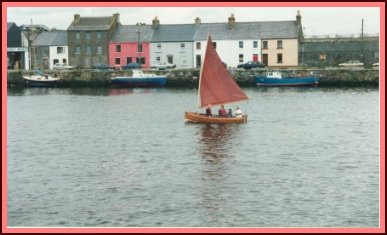
Claddagh fishing boats before 1790 were small crafts, fishing along the Connemara coast. It did not cost much money to build a Claddagh Hooker. It would cost about £20.00 and the nets and tackle for the boat would cost 15 shillings. The hooker was made out of tarred timbers and was blackened by a kind of emulsion of creosote and coal, and its mast consisted of three brown sails, the main sail, and the foresail on either side of the mast and a jib sail extended beyond the bow by a bowsail.
During the 19th century the Claddagh fishing industry went into decline due to increasing competition from larger trawlers which were fishing in Galway Bay. This gradually led to reduction in the hooker fleet as the larger and more efficient trawlers began to take over. This trend continued into the 20th century and as a result the hooker fleet was decimated. In 1980 there was no Claddagh hooker to take the Dominican priest out to bless Galway Bay. This was the first time this ever happened in the Claddagh.

In the past few years there has been a reversal in the fortunes of the hooker and some people have began to restore some of the boats back to their former glory. As a result you will now see a few hookers sailing out in Galway Bay again.
![]()
On a Sunday in mid August near the feast of The Assumption of Our Lady, crowds come to Claddagh for the age-old blessing of Galway Bay. With an escort of many boats, hookers, trawlers and smaller boats, a Dominican priest sails out into Galway Bay aboard a Galway Hooker. The ringing of the bell is the signal to form a wide circle around the boat that carries the altar boy's choir from the Claddagh Church and the Dominican priest. The priest stands at the mast of the boat in the centre of the circle of ships and prays. When the blessing is over, the boats usually take a trip around the bay before turning for home. Nowadays, popular song can also be heard, like "Galway Bay", and " Here's a toast to you Claddagh". Usually there would be a number of Claddagh Hookers but sadly there are not so many nowadays. More modern boats have replaced them. Even though the original Claddagh fleet has long since disappeared, the tradition of blessing the bay is still carried on.
